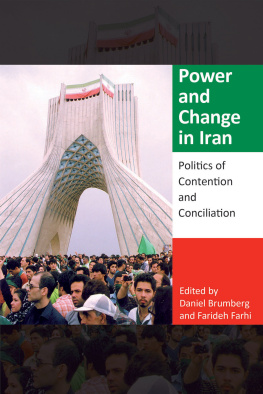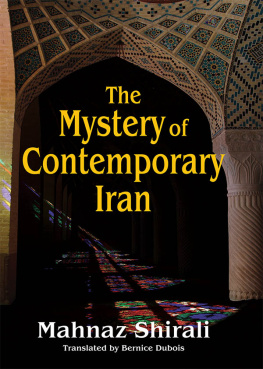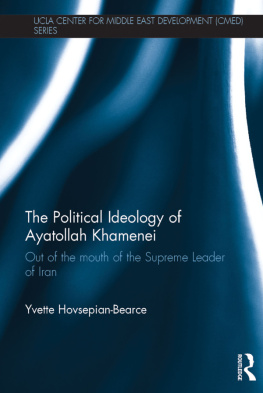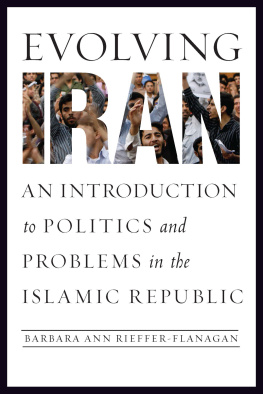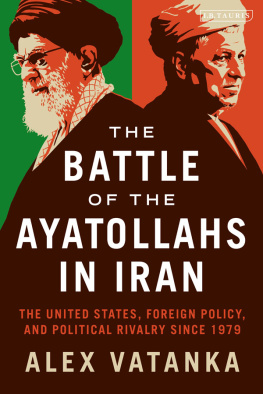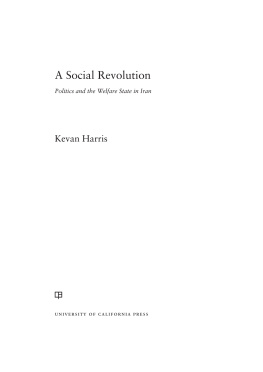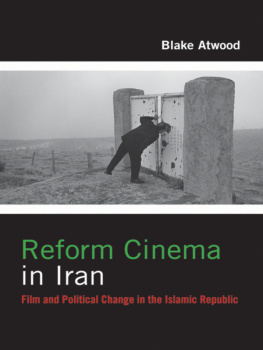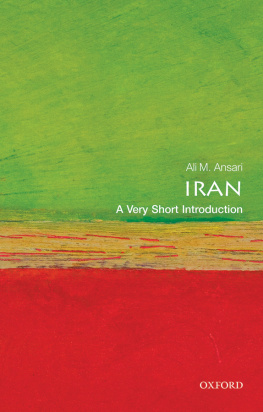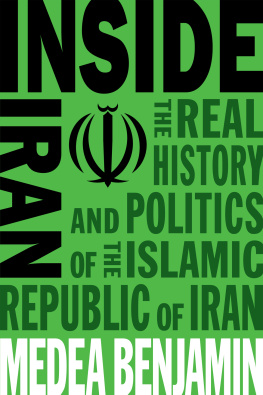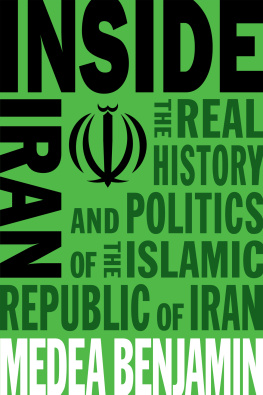
POWER AND CHANGE IN IRAN
INDIANA SERIES IN MIDDLE EAST STUDIES
Mark Tessler, General Editor
POWER AND CHANGE IN IRAN
Politics of Contention and Conciliation
Edited by Daniel Brumberg and Farideh Farhi
Indiana University Press
Bloomington and Indianapolis
This book is a publication of
Indiana University Press
Office of Scholarly Publishing
Herman B Wells Library 350
1320 East 10th Street
Bloomington, Indiana 47405 USA
iupress.indiana.edu
2016 by Indiana University Press
All rights reserved
No part of this book may be reproduced or utilized in any form or by any means, electronic or mechanical, including photocopying and recording, or by any information storage and retrieval system, without permission in writing from the publisher. The Association of American University Presses Resolution on Permissions constitutes the only exception to this prohibition.
The paper used in this publication meets the minimum requirements of the American National Standard for Information SciencesPermanence of Paper for Printed Library Materials, ANSI Z39.48-1992.
Manufactured in the United States of America
Library of Congress Cataloging-in-Publication Data
Names: Brumberg, Daniel, editor. | Farhi, Farideh, editor.
Title: Power and change in Iran : politics of contention and conciliation / edited by Daniel Brumberg and Farideh Farhi.
Description: Bloomington ; Indianapolis : Indiana University Press, [2016] | Series: Indiana series in Middle East studies | Includes bibliographical references and index.
Identifiers: LCCN 2015046017 | ISBN 9780253020680 (cloth : alk. paper) | ISBN 9780253020765 (pbk. : alk. paper) | ISBN 9780253020796 (ebook)
Subjects: LCSH: IranPolitics and government21st century.
Classification: LCC DS318.825 .P69 2016 | DDC 320.955dc23 LC record available at http://lccn.loc.gov/2015046017
1 2 3 4 5 21 20 19 18 17 16
Contents
Acknowledgments
T HIS BOOK WAS MADE possible by the support and enthusiasm of family members, friends, colleagues, and institutions whose backing over a four-year period was essential to completing the work. The editors would like to thank the US Agency for International Development for supporting the original study group, whose essays formed the basis for the book, as well as the US Institute of Peace (USIP), which provided an outstanding umbrella for the groups endeavors. Daniel Brumberg would also like to thank the Department of Government at Georgetown University for encouraging his multiple scholarly efforts on and off campus over the duration of this project. We are of course grateful to all our superb contributors, who not only met regularly to discuss their work in a spirit of scholarly exchange and intellectual openness but generously responded to our many questions, suggestions, and edits, some of which were surely quite demanding as we moved forward. Appreciation is also due to Semira Nikou and Tara Nesvaderani, who as program assistants at the USIP kept tabs on funding, meetings, and chapter revisions. Daniel Brumberg would like to thank his wife, Laurie, and son, Gabriel, for their love and support as he juggled a busy schedule to help codirect the project while Farideh Farhis gratitude abounds to Ardalan, Semira, and Kaveh for sharing their insights about Iran over the dinner table and in long walks and for making her feel lucky everyday. From the outset this project was animated by the belief that the political and social struggles that are central to the Islamic Republic of Iran have echoes in all societies and thus mirror global challenges, aspirations, and even dreams. Dan and Farideh brought this shared conviction to their fruitful and often joyous partnership, for which they are and will long remain very much grateful. Finally, we would like to thank all our comrades at Indiana University Press who have worked so hard to make this book a reality, with a special thanks to Mark Tessler, the general editor of the Middle East series, whose enthusiasm for the project helped make it possible in the first place; Rebecca Tolen, who as the sponsoring editor initiated the editing process; as well as David Miller and Jay Harward, who saw it finish.
Note on Transliteration
P ERSIAN WORDS AND NAMES have been transliterated so as to follow modern Persian pronunciation, and with the exception of ayn (), diacritical marks have been omitted. In cases where Persian names and words are already established in English, the spelling used in the mainstream media has been adopted. For Arabic terms like ijtihad and fiqh the standard used by the International Journal of Middle East Studies has been used.
Introduction
Politics of Contention and Conciliation in Irans Semiautocracy
Daniel Brumberg and Farideh Farhi
T WO SIGNAL EVENTS bracket this extraordinary collection of essays on political and social change in contemporary Iran. The first was the hotly contested reelection of Mahmud Ahmadinejad in June 2009, and the second was the surprise election of Hassan Rouhani to the presidency in June 2013. The 2009 poll precipitated massive demonstrations, as reportedly more than three million Iranians protested what they perceived as massive electoral fraud. For an exhilarating moment, it seemed as if the countrys robust authoritarian institutions were backing down in the face of the spontaneously formed Green Movement. But this was not to be. Instead, the security forces moved aggressively to complete a campaign of political repression that over the previous four years had nearly decimated President Mohammad Khatamis left-of-center Reformist Movement. Leaders of the Green Movement were imprisoned or placed under house arrest, and the circle of repression was widened by a series of televised show trials that were reminiscent of Stalinist Russia, followed by the banning of two key reformist political parties: Islamic Irans Participation Front and Mojahedin of Islamic Revolution. But if these events seemed to usher in a new era of political darkness, Rouhanis election in June 2013 shined an unexpected light on what had seemed like an endlessly dark tunnel. A veteran politician relying on open support from former presidents Akbar Hashemi Rafsanjani and Khatami, he assembled an embryonic alliance of reformists, centrists, and even some veteran conservatives. Uniting behind his candidacy, this coalition helped Rouhani defeat a divided field of hard-liners and conservatives in a campaign that exposed serious disagreements within the regime regarding the direction of the country. After securing a first-round victory with 51 percent of the vote, Rouhani promised his supporters a new era of moderation and prudence, entailing a more conciliatory foreign policy abroad and greater political openness at home. Thus politics in Iran seemed to witness a resurrection and a burst of cautious optimism that surprised Iranians as much as it did the rest of the world.
This sense of astonishment was understandable. After all, the four years that preceded Rouhanis victory were grim. During these years, the arena of political participation and debate not only came under the thumb of hard-line conservative politicians, clerics, and newspaper columnists but was increasingly dominated by a new generation of Revolutionary Guards (IRGC) and their affiliated troopsthe Basij Resistance Force. The IRGC had existed since the early days of the Islamic Republic, and had always played a special roleendorsed by Article 150 of the Constitutionas the official defender of the revolution and its achievements. However, by the late 2000s, the IRGCs political and economic clout reached new heights. This shift stemmed from a host of domestic and international facts. On the domestic front, the rise of a new generation of political activists who had fought in the 19801988 Iraq-Iran War but had remained outsideand even estranged fromthe dominant political and economic elites, generated pressure to open up political and business opportunities to this rising elite. The latters efforts were abetted by escalating regional and global conflicts. In the wake of the 2003 US invasion of Iraq and the further deterioration of US-Iranian relations, security-minded leaders argued that military, cultural, and ideological threats from the US justified a clampdown on domestic political forces that hard-liners deemed sympathetic to the US and political liberalism.
Next page
